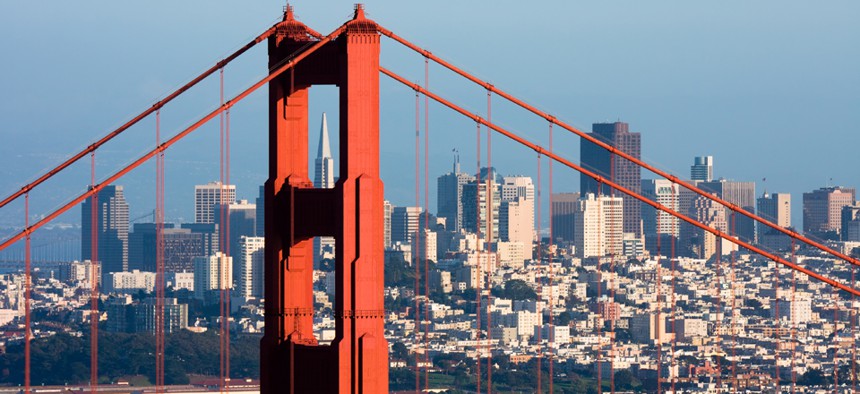Six Californias, One Super City-State

Under the proposed plan, San Francisco would be part of the new state of Silicon Valley. Andrew Zarivny/Shutterstock.com
One venture capitalist's dream to divide California into six states—while consolidating much of its power into one.
The state of California is suing San Francisco over the waterfront height limit that Bay Area residents voted into law back in June , arguing that the ballot measure usurps state power. If California finds that measure offensive, wait 'til San Francisco gets a crack at a ballot proposal to break up the whole damned state.
A proposal to divide California into six new states could appear on the November 2016 ballot, courtesy of venture capitalist and self-proclaimed "Riskmaster" Timothy Draper. According to Six Californias , the proposal has already garnered 1.3 million signatures, the first batch of which Draper submitted to election officials yesterday. If Draper has collected as many signatures as he says he has—and for the millions he's spent on the effort, it had better be true—then this Six Flags Over California scheme will go before voters the year after next.
Previously, the awesome power to split one great state into several smaller ones was exclusive to Texas, whose 1845 annexation to the U.S. included a proviso that would allow it to separate, like Voltron, into as many as five states. Then, as now, partisans cried foul. The clause in the annexation of the Republic of Texas horrified northern Whigs; today, critics accuse Draper of working to boost Republican fortunes in Congress via the political realignment and congressional representation of the six states formerly known collectively as California.
How Republicans or Democrats or, indeed, Californians would fare by splitting their single state into six depends on factors that are difficult to predict. One thing looks certain: You wouldn't want to mess with one of them.

Six Californias
The fact that one of the new states would be named Silicon Valley is reason enough to oppose Draper's plan. Really, only one hypothetical state bears a passably tolerable name: Jefferson (shown above in blue), a wink to Pacific Northwest secessionists living in southern Oregon and northern California who have pursued a separate state or independent republic of the same name since at least 1941. The remaining four states are all given relative titles: West California, Central California, South California, and North California. Since North California (shown above in purple) isn't even the northernmost part of California, the Riskmaster could probably stand to take a few more creative risks in the state-naming game.
Of the Sunshine Six, it's the Silicon State (shown in bright yellow) that looks the strongest. Under the new dispensation, Silicon Valley would emerge as one of the top five densest states in the nation, falling just behind New Jersey and Rhode Island , about tied with Massachusetts by my math. Santa Clara and Alameda, two of California's fastest-growing counties, are driving the Bay Area's rapid population growth . And San Francisco, San Mateo, Santa Clara, and Contra Costa are four of the five richest counties in California.
What if Silicon Valley state law resembled California state law? Then residents of those four counties plus Alameda (the eighth richest in California) could pass another proposal to subdivide further still and ditch their less well-off cousin counties of San Benito, Monterey, and Santa Cruz. They could call this super-dense city-state, I don't know, The Toast —and NIMBYs could prevent anyone from building another apartment in The Toast ever again.
In the meantime, cooler heads will probably prevail, and Draper's proposal probably won't come to pass. But using California's ballot-measure system to make a point about how broken California's political system is—while consolidating the wealth and demographic success of Silicon Valley and giving Orange County a great deal more say in the election of two U.S. senators—seems like a poor way to highlight abuse. It seems more like a demonstration of abuse.
A successful lawsuit on behalf of the state of California , on the other hand, might do more to show that the power of the ballot measure is not absolute. So let's leave secession to Texas .
( Image via Andrew Zarivny / Shutterstock.com )





